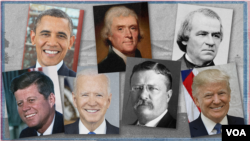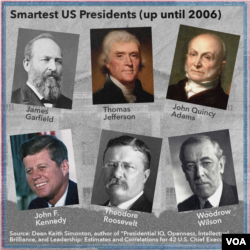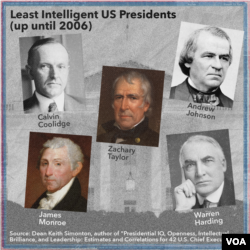America s Smartest (and Dumbest ) Presidents
Despite his detractors, Tyler passed a lot of positive legislation throughout his term, including a tariff bill meant to protect northern manufacturers.
The 15 smartest US presidents of all time
Email icon An envelope. It indicates the ability to send an email.
Twitter icon A stylized bird with an open mouth, tweeting.Twitter LinkedIn icon The word “in”.
LinkedIn Fliboard icon A stylized letter F.
Flipboard Facebook Icon The letter F.
Facebook Email icon An envelope. It indicates the ability to send an email.
Email Link icon An image of a chain link. It symobilizes a website link url.
In 2006, University of California at Davis psychology professor Dean Simonton completed a comprehensive study examining the “intellectual brilliance” of 42 US presidents.
The top 15 who appear on this list were compiled by Libb Thims — an American engineer who compiles high IQ scores as a hobby — using the results of Simonton’s study.
Because IQ scores weren’t available for all of the presidents, Simonton estimated their scores based on certain personality traits noted in their biographies that would indicate a higher-than-average level of intelligence, such as “wise,” “inventive,” “artistic,” “curious,” sophisticated,” “complicated,” and “insightful.”
Simonton then gave each president a score based on his personality traits, which he then interpreted as a measure of the chief executives’ “Intellectual Brilliance.”
15. Franklin Pierce
Franklin Pierce was the 14th president and served between 1853 and 1857. By Simonton’s estimates, Pierce had an IQ of 141.
After graduating from Bowdoin College, Pierce was elected to the New Hampshire legislature at the age of 24 and became its speaker two years later.
14. John Tyler
John Tyler served as the 10th US president after his predecessor, William Henry Harrison, died in April 1841.
Tyler attended the College of William and Mary and studied law. Although he had an (estimated) IQ of 142, his peers often didn’t take him seriously because he was the first vice president to become president without having been elected.
Despite his detractors, Tyler passed a lot of positive legislation throughout his term, including a tariff bill meant to protect northern manufacturers.
13. Millard Fillmore
Millard Fillmore was the 13th president and the last Whig president.
He had an IQ of 143, according to Simonton’s estimates, and lived the quintessential American dream. Bo rn in a log cabin in the Finger Lakes country of New York in 1800, Fillmore became a lawyer in 1823 and was elected to the House of Representatives soon after.
When Zachary Taylor died, Fillmore was thrust into the presidency, serving from 1850 to 1853.
12. Franklin D. Roosevelt
Franklin Delano Roosevelt took office during the Great Depression, serving an unprecedented four terms as the nation’s 32nd president from 1933 from 1945.
With an estimated IQ of 146, Roosevelt attended Harvard University and Columbia Law School before entering politics as a Democrat and winning election to the New York Senate in 1910.
Roosevelt was diagnosed with polio in 1921 but that didn’t stop him from winning the presidency in 1932. He’s perhaps best remembered for his New Deal program, a sweeping economic overhaul enacted shortly after he took office that aimed to bring recovery to businesses and provide relief to the unemployed.
11. Abraham Lincoln
Abraham Lincoln became the country’s 16th president in 1861, shortly before the outbreak of the American Civil War.
The son of a Kentucky frontiersman, Lincoln worked on a farm and split rails for fences while teaching himself to read and write. He had an IQ of 148, according to Simonton’s estimates, and was the only president to have a patent after inventing a device to free steamboats that ran aground.
He is best remembered for keeping the Union intact during the Civil War, and for his 1863 signing of the Emancipation Proclamation that forever freed slaves within the Confederacy.
10. Chester Arthur
Chester Arthur succeeded James Garfield as America’s 21st president after Garfield was assassinated in 1881. He had an IQ of 148, according to Simonton’s estimates.
Arthur graduated from Union College in 1848 and practiced law in New York City before being elected vice president on the Republican ticket in 1880.
When he assumed the presidency a little over a year later, he distinguished himself as a reformer and devoted much of his term to overhauling the civil service.
9. James Garfield
James Garfield was the 20th US president, serving for less than a year before being assassinated in 1882.
A graduate of Williams College, Garfield had an IQ of 148, according to Simonton’s estimates. Although his presidency was short, Garfield had a big impact. He re-energized the US Navy, did away with corruption in the Post Office Department, and appointed several African-Americans to prominent federal positions, according to White House records.
He was assassinated by Charles J. Guiteau on July 2, 1881, just 200 days after taking office.
8. Theodore Roosevelt
Theodore Roosevelt became the 26th and youngest president in the nation’s history at the age of 43. He had an IQ of 149, according to Simonton’s estimates.
Roosevelt graduated Phi Betta Keppa from Harvard in 1880, according to the White House. He then went to Columbia to study law, which he disliked and found to be irrational. Instead of studying, he spent most of his time writing a book about the War of 1812.
Roosevelt dropped out to run for public office, ultimately becoming a two-term President best known for his motto, “Speak softly and carry a big stick.”
7. Woodrow Wilson
Woodrow Wilson was the 28th president and leader of the Progressive Movement. He had an estimated IQ of 152.
Wilson was the p resident of Princeton University from 1902 to 1910 before serving as the governor of New Jersey from 1911 to 1913. After he was elected President, Wilson began pushing for anti-trust legislation which culminated in the signing of the Federal Trade Commission Act in September 1914.
He is perhaps best remembered for his speech, “Fourteen Points,” which he presented to Congress towards the end of World War I. The speech articulated Wilson’s long-term war objectives, one of the most famous being the establishment of a League of Nations — a preliminary version of today’s United Nations.
6. Jimmy Carter
James Earl “Jimmy” Carter, Jr. served as the 39th president of the US from 1977 to 1981. He won the Nobel Peace Prize in 2002 for his work in advancing human rights around the world and has an IQ of 153 by Simonton’s estimates.
Carter graduated from the Naval Academy in 1946 and was elected Governor of Georgia in 1970. After he was elected president — beating Gerald Ford by 56 electoral votes — he enacted a number of important policies throughout his four years, including a national energy policy and civil service reform.
5. James Madison
Hailed as one of the fathers of the Constitution, James Madison had an IQ of 155, according to Simonton’s estimates.
Madison graduated from what is now Princeton University in 1771 and went on to study law. He collaborated with fellow Federalists Alexander Hamilton and John Jay to produce the Federalist Papers in 1788. Madison also championed and co-authored the Bill of Rights during the drafting of the Constitution, and served as Thomas Jefferson’s Secretary of State from 1801–1809.
4. Bill Clinton
William Jefferson “Bill” Clinton was the 42nd President, serving from 1993-2001. He has an IQ of 156 by Simonton’s estimates.
After graduating from Georgetown, winning a Rhodes Scholarship to Oxford University, and earning a law degree from Yale in 1973, Clinton was elected governor of Arkansas in 1978.
He went on to win the presidency with Al Gore as his running mate in 1992 and is perhaps best remembered for his efforts brokering peace in Ireland and the Balkans.
3. John F. Kennedy
John Fitzgerald Kennedy was the 35th president of the US, serving less than 3 years before he was assassinated in 1963. He had an IQ of 158, according to Simonton’s estimates.
Kennedy graduated from Harvard in 1940 and joined the Navy shortly thereafter, suffering grave injuries while serving in World War II.
He was elected president in 1960 and gave one of the most memorable inaugural addresses in recent memory, saying, ” Ask not what your country can do for you — ask what you can do for your country.”
He is perhaps best remembered for his successful fiscal programs which greatly expanded the US economy and his push for civil rights legislation that would enhance equal rights.
2. Thomas Jefferson
Thomas Jefferson was an American Founding Father and served as the country’s third president between 1801–1809. He had an IQ of 160, according to Simonton’s estimates.
Jefferson graduated from the College of William and Mary before going on to study law. He was a notably bad public speaker, according to White House records. He reluctantly ran for president after gradually assuming leadership of the Republican party.
As a staunch federalist and advocate of states’ rights, Jefferson strongly opposed a strong centralized Government. One of his first policy initiatives after becoming President was to eliminate a highly unpopular tax on Whiskey.
1. John Adams
John Adams was the second president from 1797 to 1801, after serving as the nation’s first vice president under George Washington. He had an IQ of 173, according to Simonton’s estimates.
Adams studied law at Harvard and was an early supporter of the movement for US independence from the British. Ambitious and intellectual — if not a little vain — he frequently complained to his wife that the office of Vice President was insignificant.
He is perhaps best remembered for his skills in diplomacy, helping to negotiate a peace treaty during the Revolutionary War and avoiding a war with France during his Presidency.
America’s Smartest (and ‘Dumbest’) Presidents

Trump has refused to release his school transcripts, but presidential historian Barbara Perry has some thoughts about the former president’s brain power.
“I think he’s our most cunning president, and I think there is a certain amount of intellect that that requires,” says Perry, director of presidential studies at the University of Virginia’s Miller Center. “So, maybe for some presidents, they make up for lack of native brilliance and intelligence with cleverness. And he obviously knows how to work a crowd, so I’m not going to take that away from him.”
In 2006, psychologist Dean Simonton set out to quantify the intelligence of U.S. presidents by estimating their IQ levels. Intellectual brilliance and openness to experience were among the factors Simonton used to get an idea of which presidents actually were geniuses.

Although Harvard graduate John Quincy Adams had the highest estimated IQ (175) of all U.S. leaders, Simonton says America’s third commander in chief, Thomas Jefferson (IQ 160), was the real genius with many achievements in different areas.
“He’s a great writer. As you know, he is the main author of the Declaration of Independence. He’s a great architect, designing not only his own mansion but also the original campus of the University of Virginia. He was a political theorist. He wrote a lot of political theory that forms the basis for our Constitution,” says Simonton, professor emeritus in the psychology department at the University of California, Davis. “He was a biblical scholar. He also was a pioneer in agriculture, including growing grapes for wine. And of course, he’s a great diplomat and a great president. So, he was a very amazing guy intellectually.”
Simonton’s analysis does not include any presidents after 2006. However, Perry uses a variety of factors, including native intelligence, grades, transcripts and what universities they attended, to assess America’s most recent leaders.
“Is it their own words [in speeches]? So that shows an independent thinker. It shows whether they are clever with the language. Are they elegant and eloquent in presenting their policies? Do they have a wit about them?” Perry says. “Their writing, their speaking, their ability to speak clearly. And then there’s independence of thought and actions. Are they writing independently? Are they thinking independently? Are their policies based on their ideas?”
Using these criteria, Perry puts Barack Obama in the “highest category of intellect,” pointing out that even his fellow students at Harvard University felt the future 44th president was “on a different plane than most of the other brilliant people in the classes.”
“I surely would put Obama and [Bill] Clinton in the top five,” Perry says. “There’s just an ability of those men to comprehend, to analyze and synthesize, that is, to me, a true sign of brightness.”

Simonton says it’s difficult to assess Trump due to limited information and because one of the 45th president’s favorite methods of communication was tweeting, which does not demonstrate a complexity of thinking.
As to the current president, Perry says Joe Biden isn’t among America’s brightest leaders.
“I just never found him particularly intellectually sharp or engaging,” she says. “I think you can see that from where he went to school, from his grades. He didn’t go to the top elite schools for undergrad or graduate school. … So, I just think he is of average intellect, but obviously he has parlayed that [into the presidency] by virtue, I think, of his personality.”
America’s presidents are “definitely smarter than the general population,” according to Simonton, who adds that leaders can’t appear to be too much more intelligent than their followers because people don’t follow leaders that they don’t understand.

Both Perry and Simonton agree that America’s earliest presidents were among the most brilliant.
“One of the reasons why we could have pretty bright presidents at the beginning is that they weren’t elected by the popular vote. They were elected by electors who were chosen by state legislators. … And if you have someone who is a leader of leaders — like a CEO, who is a leader of managers below — then they tend to be more intelligent,” Simonton says. “I’ve actually done research showing that prime ministers are generally more intelligent than presidents of the United States, because they’re chosen by other leaders. You have to be pretty smart.”
America’s least bright presidents include Warren Harding, whose time in office was rocked by scandal; Andrew Johnson, a tailor who never attended school; and Calvin Coolidge, who reportedly fell asleep in afternoon meetings if he missed his after-lunch nap.
Simonton says America needs leaders who are bright enough to understand complexity and break it down enough for the American public to understand.
“It used to be that being smart was an asset — having a high IQ, having an Ivy League education, and that kind of thing. The presidency has been, I think, dumbed down, and part of that is because we have so much more access to the presidency,” Simonton says. “There’s a correlation between intelligence and problem-solving ability. What that means is that most problems are complex, and highly intelligent people are more likely to be able to solve complex problems.”
]]>